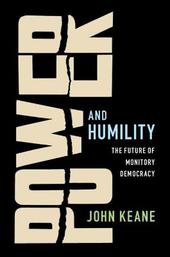
|
Power and Humility: The Future of Monitory Democracy
Paperback / softback
Main Details
| Title |
Power and Humility: The Future of Monitory Democracy
|
| Authors and Contributors |
By (author) John Keane
|
| Physical Properties |
| Format:Paperback / softback | | Pages:492 | | Dimensions(mm): Height 228,Width 151 |
|
| ISBN/Barcode |
9781108441377
|
| Classifications | Dewey:321.8 |
|---|
| Audience | | Professional & Vocational | |
|---|
| Illustrations |
Worked examples or Exercises; 1 Halftones, black and white; 5 Line drawings, black and white
|
|
Publishing Details |
| Publisher |
Cambridge University Press
|
| Imprint |
Cambridge University Press
|
| Publication Date |
30 August 2018 |
| Publication Country |
United Kingdom
|
Description
Democracy urgently needs re-imagining if it is to address the dangers and opportunities posed by current global realities, argues leading political thinker John Keane. He offers an imaginative, radically new interpretation of the twenty-first-century fate of democracy. The book shows why the current literature on democracy is failing to make sense of many intellectual puzzles and new political trends. It probes a wide range of themes, from the growth of cross-border institutions and capitalist market failures to the greening of democracy, the dignity of children and the anti-democratic effects of everyday fear, violence and bigotry. Keane develops the idea of 'monitory democracy' to show why periodic free and fair elections are losing their democratic centrality; and why the ongoing struggles by citizens and their representatives, in a multiplicity of global settings, to humble the high and mighty and deal with the dangers of arbitrary power, force us to rethink what we mean by democracy and why it remains a universal ideal.
Author Biography
John Keane is Professor of Politics at the University of Sydney and at the Wissenschaftszentrum Berlin and Distinguished Professor at Beijing University. His many published works include Democracy and Media Decadence (Cambridge, 2013) and When Trees Fall, Monkeys Scatter: Rethinking Democracy in China (2017).
Reviews'There are very few scholars in the world with the intellectual capacity that is needed to understand the past, present and future of democracy on a truly global scale. John Keane is undoubtedly one of them. For those of us that thought - even hoped - that John Keane's The Life and Death of Democracy was his magnum opus, we must now deal with an even more ambitious contribution to the field. In calling for a radical stretching and refiguring of the imaginary horizons of democracy, Keane is pushing back the most basic boundaries of human understanding and raising profound questions about the future of politics in the twenty-first century. Written in a style that is as accessible and entertaining as it is devastatingly precise and informative, this is quite simply a brilliant book.' Matthew Flinders, University of Sheffield 'Democracy is in crisis everywhere and it ought to be re-imagined. Only visionary theorists such as John Keane can do this. His collection of essays written in a 'pizzicato' style is a real intellectual treat for both students and practitioners of democracy. Keane views liberal democracy as a 'living-dead zombie' and brings our attention to a new historical genus generated by the galaxy of (virtual) media: the monitory democracy. The book invites us to question the conventional wisdom and suggests how to make democracy thrive, even against daunting odds.' Jan Zielonka, University of Oxford and Ralf Dahrendorf Professorial Fellow at St Antony's College 'When so many people have been dismayed by democracy, we need a strong voice such as Mr Keane's to uphold our faith in it, for the alternative is far worse.' Hu Yong, Peking University 'John Keane's call to democratize the study of democracy is an important intervention. The book is a must-read for anyone who wishes to be inspired and challenged when thinking about the virtues democracy demands in the age of communicative plenty.' Nicole Curato, Institute for Governance and Policy Analysis, University of Canberra 'Like a Socratic wasp, John Keane's innovative book shows us how to look at democracy from a space-time perspective that detects multiple variations of the political form known as democracy and the cultures and traditions in which it takes root. The age we are in today entails that the power of the will (elections and deliberation) is no longer master in the field, while the negative power of judgment expands. The Internet facilitates this, with the paradox of enlarging citizens' indirect influence instead of direct participation. It is thus the meaning of participation that changes and makes contemporary democracy radically different from the ancient one, not merely in the institutions but above all the value of political autonomy. It seems that the age of monitory democracy is one of power dispersion and depersonalization in the fullest - a liberal age.' Nadia Urbinati, Kyriakos Tsakopoulos Professor of Political Theory, Columbia University, New York
|